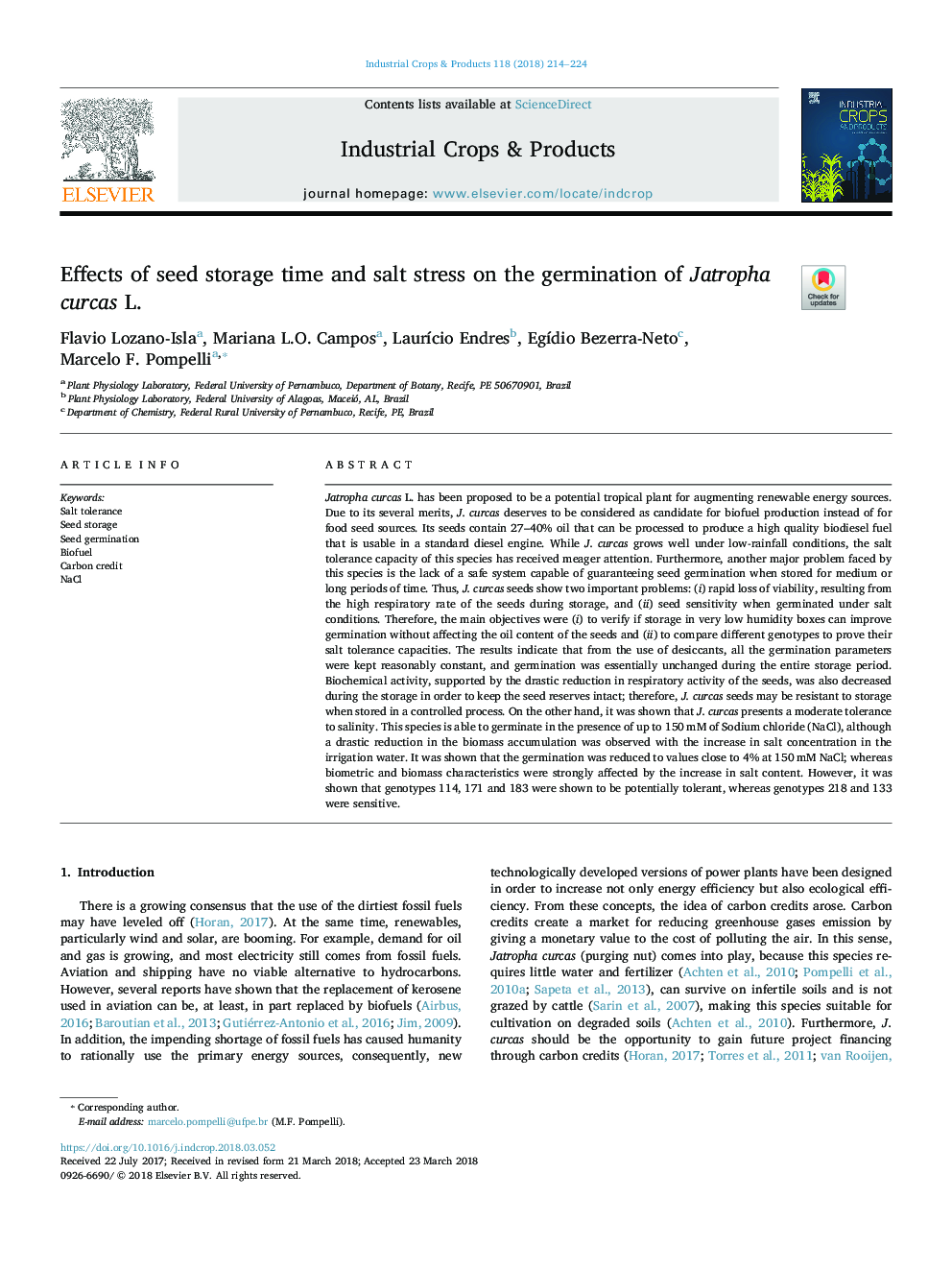| کد مقاله | کد نشریه | سال انتشار | مقاله انگلیسی | نسخه تمام متن |
|---|---|---|---|---|
| 8880103 | 1624792 | 2018 | 11 صفحه PDF | دانلود رایگان |
عنوان انگلیسی مقاله ISI
Effects of seed storage time and salt stress on the germination of Jatropha curcas L.
دانلود مقاله + سفارش ترجمه
دانلود مقاله ISI انگلیسی
رایگان برای ایرانیان
کلمات کلیدی
موضوعات مرتبط
علوم زیستی و بیوفناوری
علوم کشاورزی و بیولوژیک
علوم زراعت و اصلاح نباتات
پیش نمایش صفحه اول مقاله

چکیده انگلیسی
Jatropha curcas L. has been proposed to be a potential tropical plant for augmenting renewable energy sources. Due to its several merits, J. curcas deserves to be considered as candidate for biofuel production instead of for food seed sources. Its seeds contain 27-40% oil that can be processed to produce a high quality biodiesel fuel that is usable in a standard diesel engine. While J. curcas grows well under low-rainfall conditions, the salt tolerance capacity of this species has received meager attention. Furthermore, another major problem faced by this species is the lack of a safe system capable of guaranteeing seed germination when stored for medium or long periods of time. Thus, J. curcas seeds show two important problems: (i) rapid loss of viability, resulting from the high respiratory rate of the seeds during storage, and (ii) seed sensitivity when germinated under salt conditions. Therefore, the main objectives were (i) to verify if storage in very low humidity boxes can improve germination without affecting the oil content of the seeds and (ii) to compare different genotypes to prove their salt tolerance capacities. The results indicate that from the use of desiccants, all the germination parameters were kept reasonably constant, and germination was essentially unchanged during the entire storage period. Biochemical activity, supported by the drastic reduction in respiratory activity of the seeds, was also decreased during the storage in order to keep the seed reserves intact; therefore, J. curcas seeds may be resistant to storage when stored in a controlled process. On the other hand, it was shown that J. curcas presents a moderate tolerance to salinity. This species is able to germinate in the presence of up to 150â¯mM of Sodium chloride (NaCl), although a drastic reduction in the biomass accumulation was observed with the increase in salt concentration in the irrigation water. It was shown that the germination was reduced to values close to 4% at 150â¯mM NaCl; whereas biometric and biomass characteristics were strongly affected by the increase in salt content. However, it was shown that genotypes 114, 171 and 183 were shown to be potentially tolerant, whereas genotypes 218 and 133 were sensitive.
ناشر
Database: Elsevier - ScienceDirect (ساینس دایرکت)
Journal: Industrial Crops and Products - Volume 118, August 2018, Pages 214-224
Journal: Industrial Crops and Products - Volume 118, August 2018, Pages 214-224
نویسندگان
Flavio Lozano-Isla, Mariana L.O. Campos, LaurÃcio Endres, EgÃdio Bezerra-Neto, Marcelo F. Pompelli,